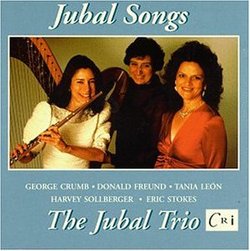| All Artists: Leslie Bassett, Don Freund, Tania Leon, Harvey Sollberger, Eric Stokes, Jubal Trio, Sue Ann Kahn (flute), Susan Jolles (harp), Christine Schadeberg (soprano) Title: Jubal Songs - Donald Freund: Backyard Songs / George Crumb: Federico's Little Songs for Children / Harvey Sollberger: Life Study / Tania Leon: Journey / Eric Stokes: Song Circle - The Jubal Trio Members Wishing: 0 Total Copies: 0 Label: Composers Recordings Release Date: 1/21/1997 Genres: Special Interest, Pop, Classical Styles: Wedding Music, Vocal Pop, Opera & Classical Vocal, Chamber Music, Historical Periods, Modern, 20th, & 21st Century Number of Discs: 1 SwapaCD Credits: 1 UPC: 090438073820 |
Search - Leslie Bassett, Don Freund, Tania Leon :: Jubal Songs - Donald Freund: Backyard Songs / George Crumb: Federico's Little Songs for Children / Harvey Sollberger: Life Study / Tania Leon: Journey / Eric Stokes: Song Circle - The Jubal Trio
CD Details |
CD ReviewsMesmerizing Crumb (not Bassett!) and some interesting discov Discophage | France | 04/21/2007 (4 out of 5 stars) "The five compositions on this disc were written for the Jubal Trio, an ensemble with the uncommon line-up of soprano, flute and harp. It takes its name from Handel's aria in his oratorio Joshua "O Had I Jubal's Lyre and Miriam's Tuneful Voice", and hence from the ancestor of all those who play the harp and the pipe, according to Genesis 4, 21.
I came to this disc as I wanted to hear more music of Donald Freund, whom I had discovered through a short, dazzling orchestral overture, "Radical Light", on a collection of contemporary pieces by the student orchestra of the Bowling Green University in Ohio (see my review of New Music From Bowling Green). His Backyard Songs draw their inspiration from and seek to emulate the Jazz singing of Ella Fitzgerald and of Memphis Blues singer Ruby Wilson. Each songs is introduced by precisely notated scat singing - a bit of an oxymoron, that - and the vocal line in each song is Jazz/Blues-inspired, with a (certainly sought for) impression of clashing with the more contemporary language of the flute and harp accompaniment. But Christine Schadeberg is a classically trained soprano (and an excellent one too), making the music sound more like Bernstein's Broadway music than genuine Jazz. And the music's limitation anyway seems to me to lie in its derivative character. I feel that Freund hasn't always completely mastered and transformed his Jazz/Blues material so to make it an entirely personal re-creation. The second piece is the most interesting, both for its choice of poem and musical elaboration (in which the two instrumentalists are asked to deliver the text as well, chorus-like), evocative of Michael Tippett's similar "Bluesy" inspirations. Crumb (and not any "Brass Quintett" by Leslie Bassett! One wonder's how that wandered in the product information) is the grand pop' of this assemblage and, once again, he is the more original and fascinating voice. His Federico's Little Songs for Children were written for the Jubal trio, and they feature all his characteristic compositional trademarks: the eerie and mesmerizing sounds he elicits from the two instruments (along with some whistling) and the haunting, witty, whimsical melismatas he attributes to the vocalist. There is another version of the piece by Susan Narucki on the Bridge Crumb edition, but this one, by the dedicatees, remains indispensable. Though more traditional-oriented, Eric Stokes' Song Circle is also quite winning. Stokes writes wonderfully skilfully and imaginatively for the two instruments, and is no slouch either at turning out a haunting melody. It is sometimes evocative of the later Britten (Death in Venice) or, as in the moving "Onion", Tippett's Bluesy inspiration. Eric Stokes, born in 1930, died two years after this disc was recorded, in 1999. I'll explore more of Stokes' compositions. Harvey Sollberger's 19-minute "Life-Study" is the most experimental composition of this set, the one that sounds the most like a cliché of "contemporary music" from the 1970s: the poem is by himself, the music setting starts with various onomatopoeia (by all three performers) and sounds (fist striking harp), flute and harp are often used percussively rather than melodically. The piece is also "post-modern" in its use of various quotations, from Renaissance music, Dante's Inferno, Shakespeare's Sonnets, pointillist atonality, salsa, cabaret, giving the piece the aspect of music-theatre in miniature. The poem starts with the words "it is difficult to say what must be said, at times, To sing it, too, is no great help..." See the bearing? Still, it is interesting in its radicalism and experimental nature, if not exactly seductive and "easy listening". Tania Leon's short (3:30) Journey is also very "contemporary" in its use of wide intervallic leaps for the voice and the angular motives given to the flute, as well as its utilization of the text not for its meaning - except for the first phrase it is uttered "in reverse" ("Universe" becomes "Es ri vi nu") but for its purely sonic value. " |


 Track Listings (15) - Disc #1
Track Listings (15) - Disc #1